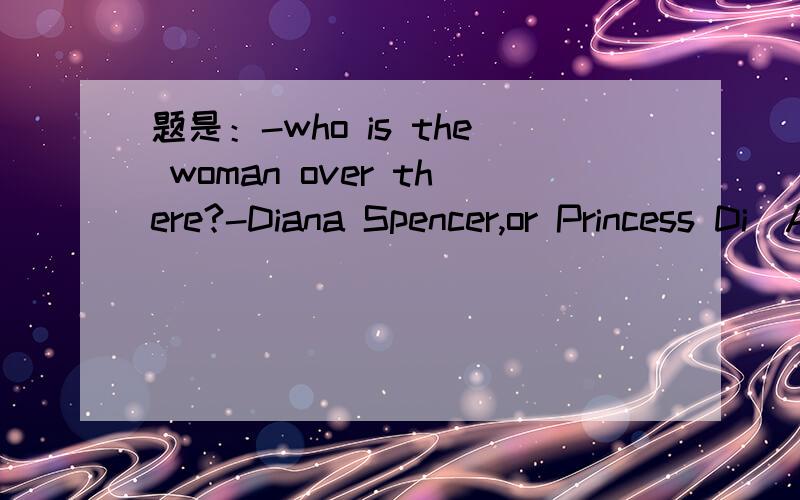题是:-who is the woman over there?-Diana Spencer,or Princess Di(A)she became well-known.选项:A as ;B for;C before ;D since 为什么要选A?
来源:学生作业帮助网 编辑:作业帮 时间:2024/05/02 20:07:31

题是:-who is the woman over there?-Diana Spencer,or Princess Di(A)she became well-known.选项:A as ;B for;C before ;D since 为什么要选A?
题是:-who is the woman over there?-Diana Spencer,or Princess Di(A)she became well-known.选项:A as ;B for;C before ;D since 为什么要选A?
题是:-who is the woman over there?-Diana Spencer,or Princess Di(A)she became well-known.选项:A as ;B for;C before ;D since 为什么要选A?
as在这里是引导从句的,但是在这里其实并不是主要指原因,而是强调“随着”的意思,也就是随着“she became well-known”(她越来越有名),人们不会再称呼她的本名戴安娜了,而是取而代之一个称号princess(王妃).
如果是要带原因从句的话,其实B和D都可以
as这个词,建议你再查查字典,意思很多
A貌似是因为的意思
原因状语从句
一 because, since,as和for引导的原因状语从句
1 because(因为):表示直接的原因或理由,着重点在从句,用于回答why,语气最强。
He didn't go to school because he was ill.
Why didn't he go to school? Because h...
全部展开
A貌似是因为的意思
原因状语从句
一 because, since,as和for引导的原因状语从句
1 because(因为):表示直接的原因或理由,着重点在从句,用于回答why,语气最强。
He didn't go to school because he was ill.
Why didn't he go to school? Because he was ill.
2 since(既然):一般表示对方已知的,无须加以说明的即成事实的理由,全句中心在主句,语气比
because弱。
Since you are ill, I'll go alone.
3 as(由于):表示十分明显的原因,一般说明因果关系,着重点在主句,语气较弱。
As it is snowing, we shall not go to the park.
4 for(因为,其理由是):是个并列连词,只能放在另一个并列句后面,表示推理或解释,或用作附加说明,表示新的情况,而不是指理由或原因,语气最弱,一般不放在句首。
The day breaks, for the birds are singing.
* for表示因果关系时,可以同because交替使用,但for前须用逗号,而because则不必。
You couldn't have seen him because he wasn't there.
= You couldn't have seen him, for he wasn't there.
*当原因是显而易见的或已为人们所知,就用as或since,且多放在句首。
Since/ As the weather is so bad, we have to delay our journey.
二 now (that) (既然,现已...所以,当...才);
Now (that) you've grown up, you should not behave like a child.
Now (that) I am older I see things differently.
Now (that) I have heard the music I understand why you like it.
这两个题我也不会,高考这种题考的不多吧,我们上高三的时候,很少考for的这种用法.如果不明白的话,就把它记住吧.
参考资料:http://i.cn.yahoo.com/04400017582/blog/p_9/
收起